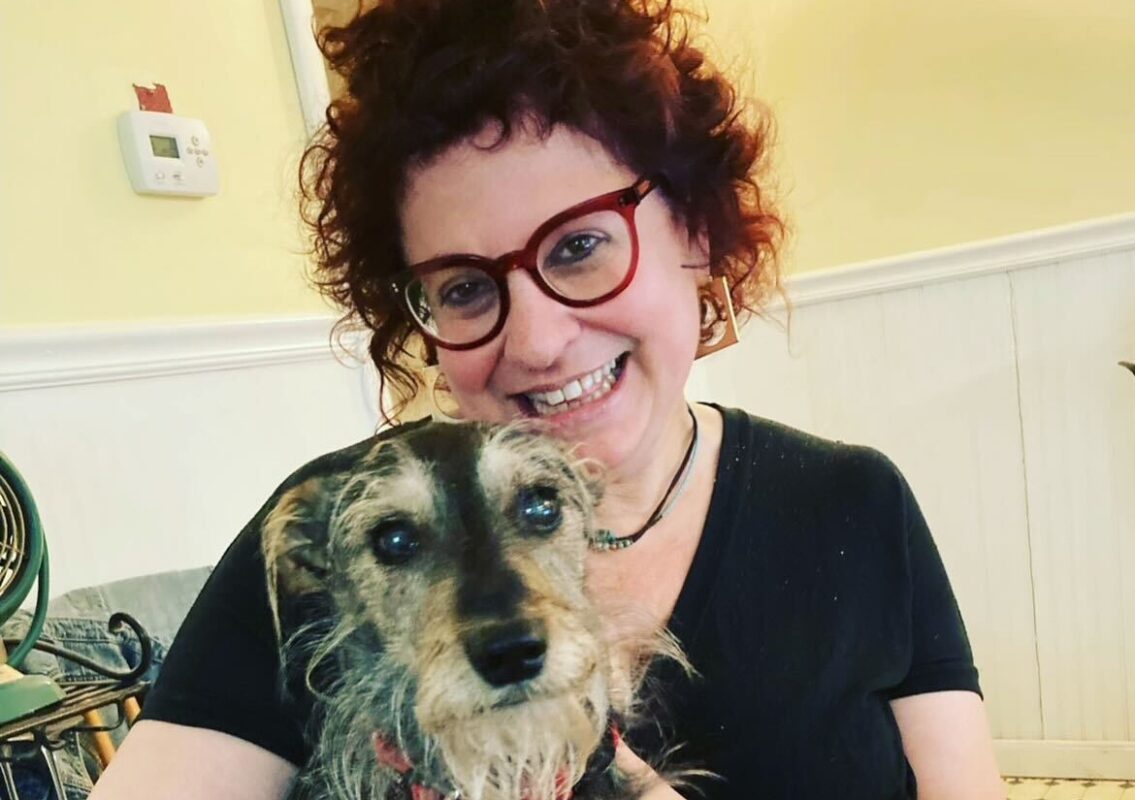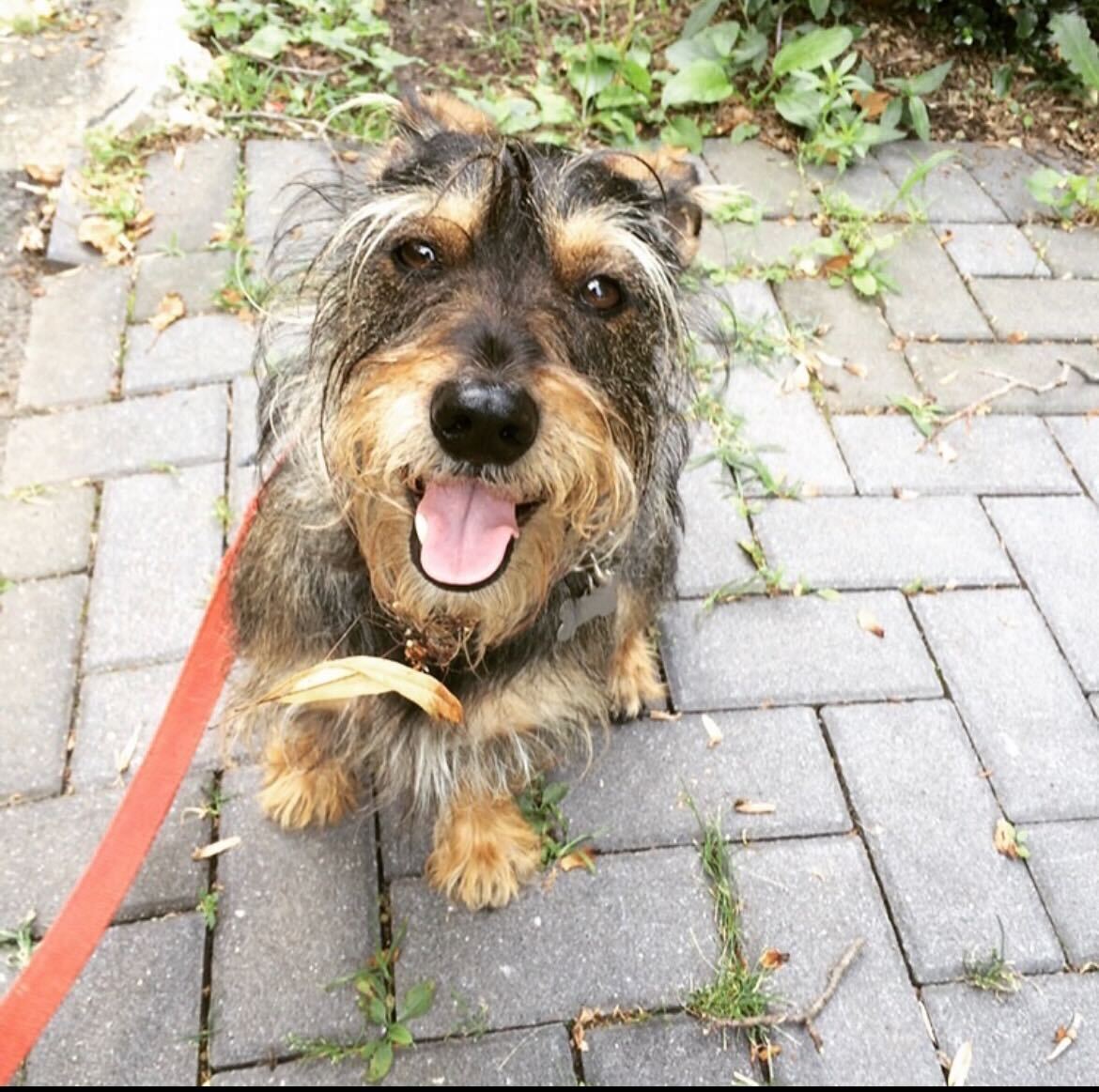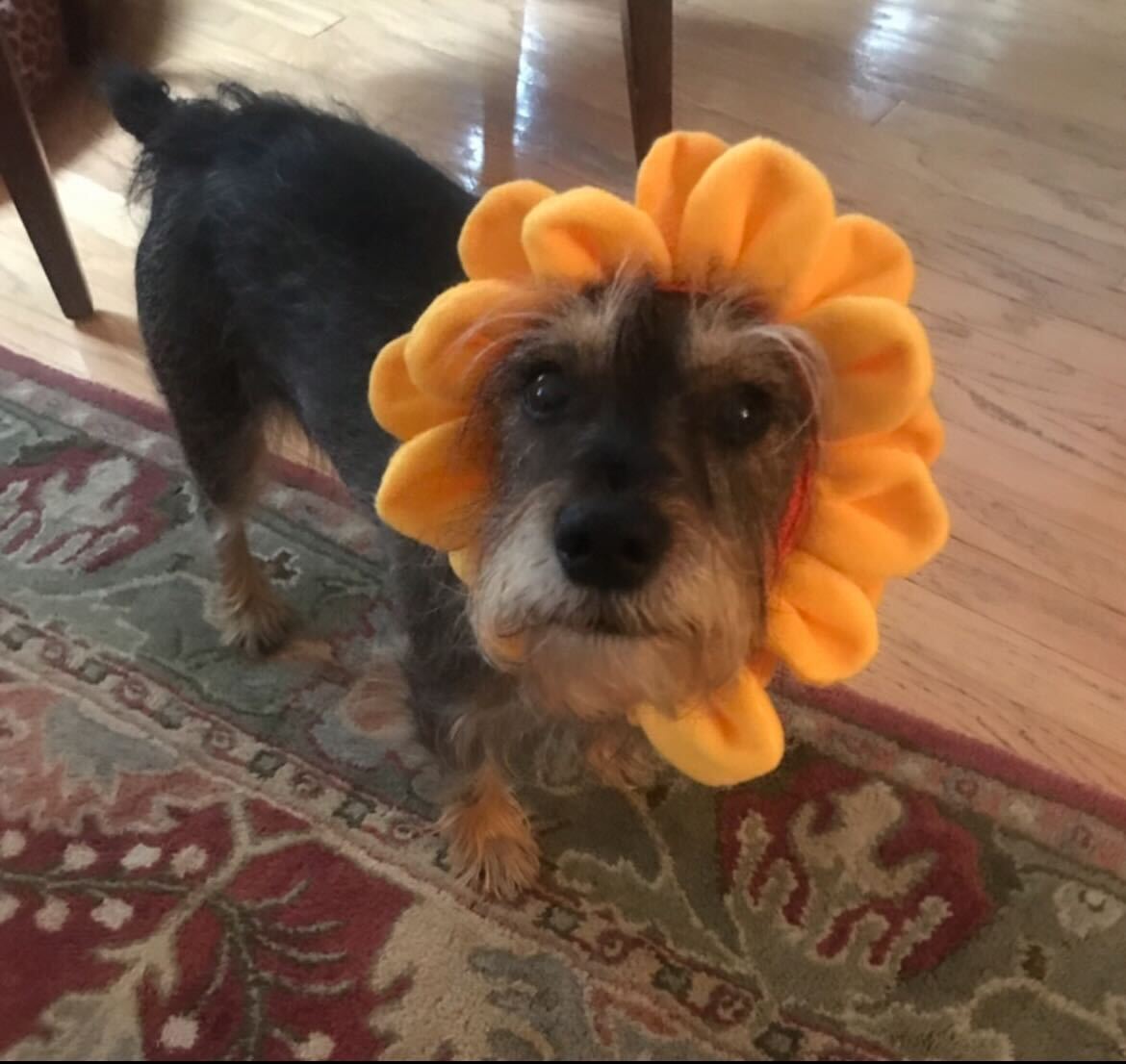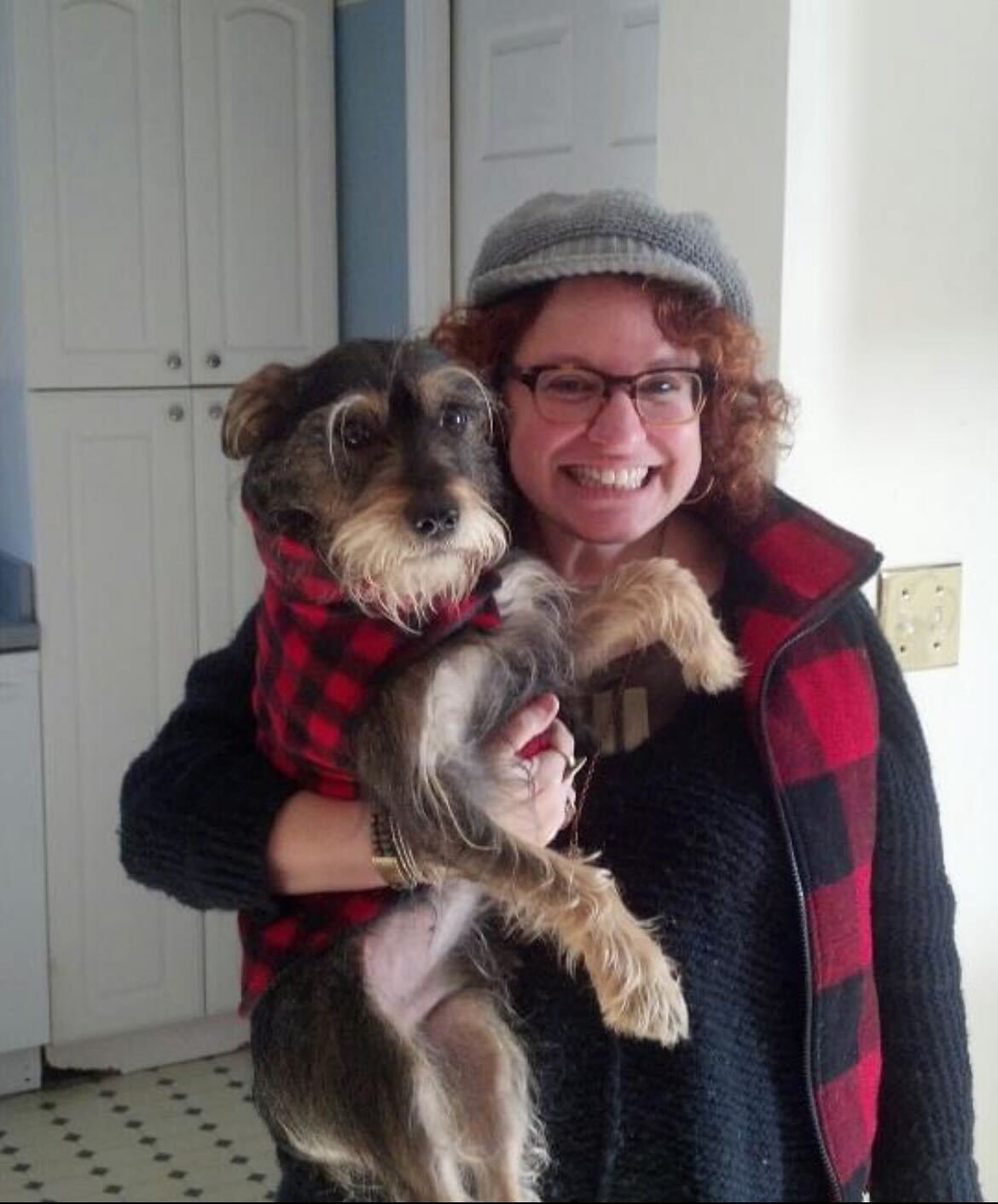
Oscar was chasing tennis balls again. He had been sick, but now he was better. I called my mother, “Mom! Oscar is playing with tennis balls again! He’s healthy! He’s happy!” And then I woke up.
When Oscar got sick, he made a hypocrite out of me. I’d always been a vocal supporter of canine euthanasia. I would say things like, “We should all be so lucky—to die peacefully, surrounded by loved ones, before the pain becomes unbearable.” I also confidently advised friends who were struggling with their own ailing dogs, “You’ll know when it’s the right time. The dog will tell you.”
And then Oscar was diagnosed with cancer. Two inoperable masses, one on the lungs, one on the liver, plus Cushing’s Disease, which affects the kidneys.
That was one year ago. I watched as my spry, 14-year-old terrier mix, with his comically expressive ears and obsession with squirrels and tennis balls, got weaker and weaker. He struggled with the stairs, so I would carry him up when it was time to go to bed (of course he slept in the bed with me). Our walks outside became shorter—and slower, as he dutifully smelled every tree, hydrant, and bush, both out of standard doggy curiosity and also, I realized, to catch his breath. Then he started falling—just toppling over out of the blue (it would’ve been funny if it weren’t so sad).
At some point, he could no longer walk. And then he could no longer stand. His appetite, never ravenous, was diminished. He drank a lot more, but was still dehydrated.
I work from home, so I put a dog bed next to my makeshift office in the kitchen and set up a “water station” (a bowl of water stacked on two books) to help him easily drink. Soon, he needed help pivoting his head. Sometimes, I would go out for a few hours and come home to find his head hanging over the edge of the bed because he didn’t have the strength to straighten himself up.
At this point, I’m quite sure that most people would’ve chosen to euthanize Oscar. But I loved this dog, perhaps to an unreasonable degree.
I’d gotten him when he was a puppy. Just four months old. I raised him. He was adorable—he had these ridiculous eyebrows that made him look like Wilford Brimley or Sam Elliott, depending on who you asked—and he was a little hyper. “He’ll calm down in a few years,” people told me. (He didn’t calm down until he was about 10.).

He was also hilariously, exquisitely weird. Oscar created all these arbitrary rules for himself, most that involved sitting. He would sit before I put his leash on. I never trained him to do this, but he did it like it was his job. He also would sit before he was fed—and sometimes, oddly, he would sit far away from the bowl, like 10 feet away, until I gave him the enthusiastic go-ahead. Again, I didn’t teach him this.
He had fears that waxed and waned—vacuum cleaners, thresholds, the spiral stairs in my sister’s house. Sometimes he forgot he was afraid of those things and would bound down the stairs, not a care in the world. Other times, he would get stuck on the third or fourth step, waiting to be rescued.
He was snuggly—loved being picked up and pet—and actually liked to have his picture taken. (He was enormously patient with me when I dressed him up like a daffodil or a prisoner or a cow.)

During the pandemic, he was a lifesaver, a lifeline. It might sound ridiculous, but we got even closer.
And now he was dying. But he was…still there. First of all, he was still eating—yes, I was hand-feeding him rare roast beef from Eddie’s ($15 for 8 slices!) and only his favorite dehydrated chicken liver treats (we taste-tested dozens of varieties until we found the ones he liked best). But he ate, happily. If I was eating steak or burger for dinner, he got some of that, too—and he gobbled it up.
Also, he still liked being pet. If we were sitting on the couch together and I stopped stroking him, he would give me the side eye: “What gives, ma?” Sometimes, in these moments just chilling on the couch, I could almost forget that he was sick.
I googled, “When do you know it is time to put down your dog?” There were check-off tests, with questions like, “Does your dog take pleasure in activities he used to love?” and “Is your dog happy to be around family?” I took a lot of those tests. Oscar always scored near the bottom, but not at the bottom.
He was so sick, so weak, but he wasn’t in pain. And he was still my Oscar. I didn’t have to make any decisions right away. Until I did.
My Uncle Richard, who lived in Manhattan, died in March. I was extremely close to my uncle, my mother’s younger brother. In some ways, he was like a second father to me—and a man I loved and admired immeasurably. So I was beside myself with grief. I also didn’t know what to do with Oscar.
I googled, “NYC hotels that accept dogs.” This seemed like a fairly reasonable solution. Oscar mostly slept anyway. Except that night at home, Oscar was making these moaning sounds and when I picked him up, he shat all over my corduroy pants, the couch, and the carpet. Not even a rock star on a bender could cause that much destruction in a hotel room.
I called Kelly, my longtime pet sitter, who loved Oscar and has such a natural ease around all dogs I call her the “Dog whisperer.”
“I know this is a lot to ask,” I prefaced. And then went on to explain how Oscar was essentially in hospice care and needed to be hand-fed and carried around like a little prince and propped up when he peed and pooed. She didn’t hesitate to say yes. (Moral of the story, one that I need to really internalize: Ask people for help.)
While we were in New York, Oscar got an eye infection and Kelly took him to the vet. They gave him medicine for his eye, and subcutaneous fluids for his dehydration.
I called the vet when I got home from the funeral. She recommended euthanasia, in no uncertain terms. I appreciated this, in a way. None of the wishy washy, “It’s up to you. I can’t make the decision for you.” She was clear. And maybe even a little scolding.
With a full head of steam, I called Peaceful Passage, a company that will come to your home and gently euthanize your dog. Lots of people had recommended them. It was Monday. I made the appointment for Thursday. I broke down on the phone.
Tuesday came. I looked at Oscar, curled up in his little bed, breathing evenly. I fed him two slices of roast beef.
By Wednesday, I was beside myself, in a panic. I called Peaceful Passages to cancel the appointment. “He’s not ready,” I moaned. “I’m not ready.” They understood. (Something tells me I wasn’t the first client to get cold feet.) The relief that I felt that day was immense.
Three weeks passed. I began to think my neighbors were gossiping about me, as I hovered over my partially paralyzed dog, positioning his legs so he didn’t pee on himself (usually unsuccessfully) three times a day.
“Why is she keeping that poor dog alive?” they were undoubtedly whispering. “It’s torture!” Of course, no one was saying this, or even thinking this. It was clearly my internalized guilt.
A week later, we were at my uncle’s memorial service in New York. Kelly watched Oscar again. (I started calling her my “angel.” I don’t even talk like that. But it seemed appropriate.)
On the way home, we got a phone call from a pet sitter. But not my pet sitter. My sister’s. Her dog Ruby—the same age as Oscar, but healthy, spry, smart as a whip, the picture of geriatric health—had had a series of seizures. It was likely a brain tumor. That night my sister, Felicia, had to put Ruby down. My sister loved Ruby—who I called “Little LuLu”—with the same fervor that I loved Oscar. The irony was cruel. As a family, we had spent months fretting over Oscar. And now Ruby was gone, just like that.
Felicia and I discussed which was worse—a dog dying suddenly or a dog slowly wasting away. We decided both equally sucked.

Meanwhile, there was Oscar. Kelly, who’d been down this path with her own beloved Rambo, taught me how to do subcutaneous fluids. It sounds harder than it is. The vet gives you a sack of liquid and a bunch of needles. You put the needle in the fatty part of the dog’s flesh, not internally. I hate needles and, what’s more, I am utterly incompetent when it comes to anything even remotely mechanical. (I’m the type who will be helplessly standing at the door to the Airbnb saying, “This key doesn’t work!”). But I learned how to do the fluids. Kelly knew someone whose cat lived an extra year thanks to daily fluids.
I had hope.
But Oscar got even worse. He had a hard time swallowing. He would gulp, hard, and sometimes throw up. I always told myself that I wouldn’t let him suffer. When he began throwing up his food, I knew it was time. I called Peaceful Passages and made an appointment for the next day.
A confession: I secretly hoped Oscar would die that night. That I wouldn’t have to make the decision. But that wasn’t the case. The morning of his appointment he was still alive. He helped me a bit by throwing up his breakfast. Groaning a bit in his bed. I gave him an extra dose of pain medication. I was doing the right thing.
My mother came over to give me emotional support and say goodbye to her grand-pup. The vet from Peaceful Passages came and asked if I was ready.
“No,” I thought.
“Yes,” I said.
The vet crouched by Oscar’s dog bed, gave him a sedative. Then an injection. And my boy was gone.
Almost right away, irrationally, I regretted it. Once I was alone in the house, I wailed. I wanted him back.
But of course, I didn’t want weak, immobilized, dying Oscar. I wanted him the way he was before he got sick—romping, silly, ridiculous. Letting him go took all the strength I could muster. People say he hung on too long for me. I arguably waited too long to say goodbye.
For both of us, a final act of love.
